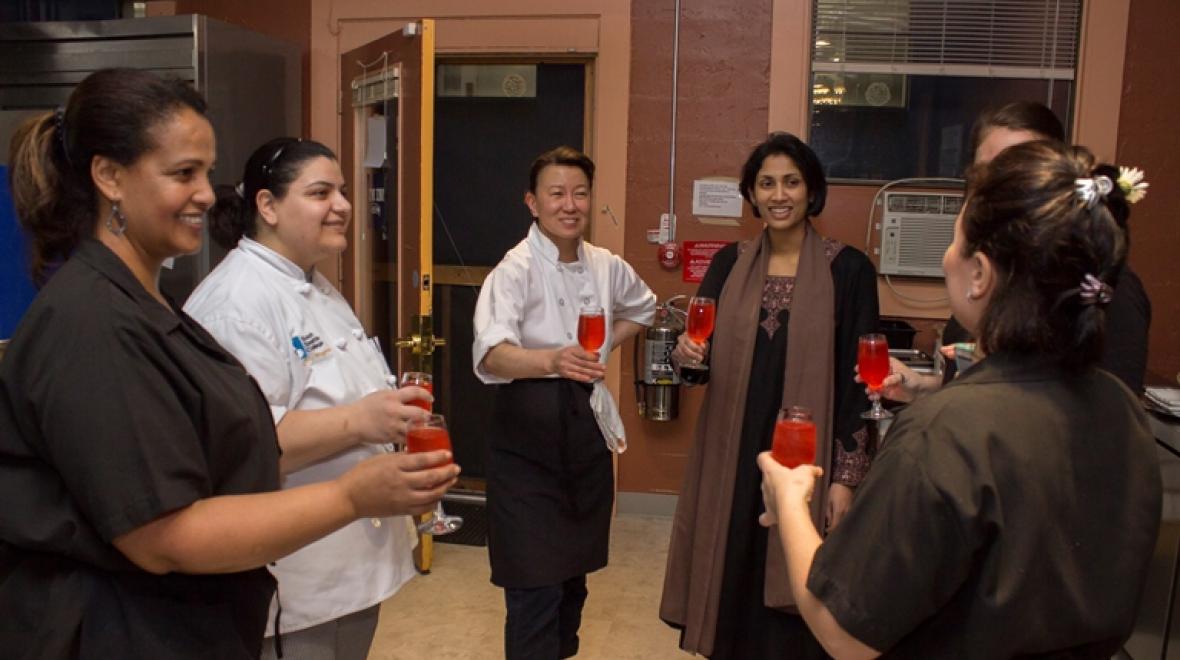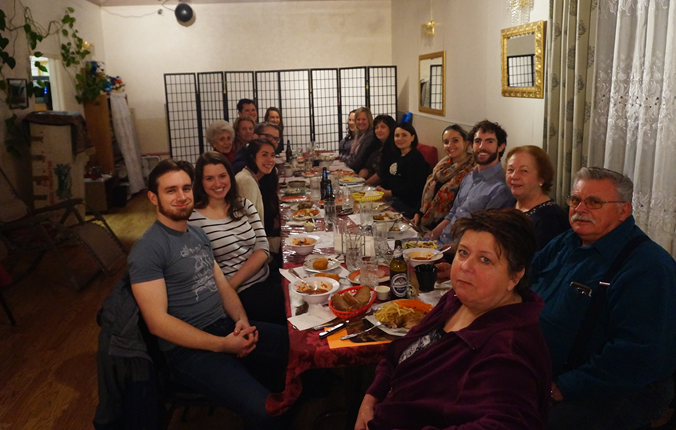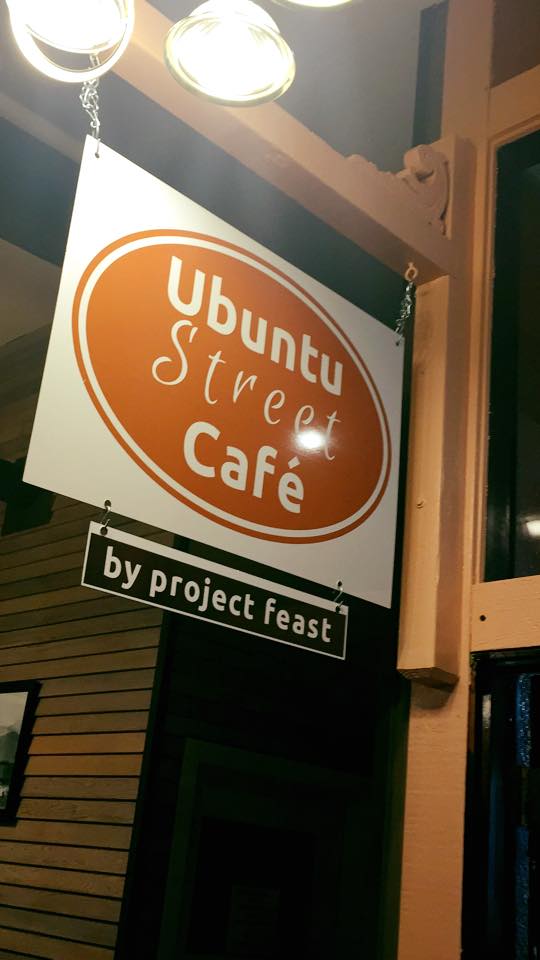
Photo:
Ubuntu Street Cafe. Photo credit: Mo Aoun
Abshir Warsame, who fled Somalia’s civil war as a teen with his family in the early 1990s and now owns the bustling Juba Restaurant and Café in Tukwila, wants you to know three things. One: While his Somali eatery is a hub for the Somali (and broader East African) community, frequented by cabbies and SeaTac airport workers, Warsame opened Juba to create a welcoming place for all diners. Two: the father of eight believes the American Dream is “alive and well.” Three: While camel meat is a Somali delicacy, it isn’t on the menu (too hard to get).
My 14-year-old daughter and I were part of a group of 20 or so gathered at Warsame’s restaurant for a recent installment of Migrating Meals, an event series featuring a family-style meal at a different King County refugee- or immigrant-run restaurant or café each month with conversation sparked by the home country of the owner and/or the food being served.
Project Feast, a Kent-based nonprofit, runs the series as part of its mission to empower refugee and immigrant cooks and forge connections across cultural divides. To date, Migrating Meals has drawn a mostly adult crowd (my kid was one of two at the March event), but families of school-age kids are welcome. (As you’ll see from the event description, bringing older kids is most appropriate.)
Migrating Meals offers families a chance to stretch beyond their everyday routines to experience new cultures, foods and neighborhoods. King County residents speak more than 120 languages; from 2000 to 2010, the county gained more than 200,000 new residents, half of whom were immigrants and refugees from Asia, Latin America, Eastern Europe and Africa. Past Migrating Meals have featured eateries from the Bhutanese-Nepalese, Ukrainian, Ethiopian and Kurdish communities.
This is a place to build community across cultures, through food.
And it’s an especially timely opportunity for some family cross-cultural learning, with immigrants and immigration under fire from President Trump and alleged hate crimes and incidents making headlines locally and across the country.
“Around the table is where we build our family culture and traditions,” Project Feast program coordinator, Molly Payne, tells our group at Juba, gesturing to the long line of tables we occupy. “This is a place to build community across cultures, through food.”
Learning over goat bone broth
We slurped down bowls of goat bone broth and pitchers of mango juice and attacked metal platters heaped with tender roasted halal lamb, goat, beef and salmon (a decidedly local adaptation, as Warsame said Somalis don’t typically eat much fish), green salad, and mountains of aromatic rice, accompanied by a whole, ripe banana. We spied some diners using the banana like a utensil and eating bites as they went; Warsame suggested slicing the banana into our meat and rice dishes — delish in combo with his homemade bright green jalapeno-based basbaas hot sauce.

Our table’s conversation ranged from segregation and discrimination to favorite local ethnic eating spots to the Somali civil war and the Trump “travel ban.” (Somalia is one of the six majority-Muslim countries whose residents would be blocked from traveling to the United States in an executive order now tied up in the courts.)
Between running back and forth from his busy kitchen, Warsame stopped by each table, gamely fielding questions about Somali culture, food and history. My daughter wanted to know why no dessert was on the evening menu (it’s more of a special-occasion thing) and what a typical Somali breakfast might be (a crepe-like pancake drizzled with sesame or olive oil with or without dried beef jerky). We learned about ayuto, a community fund members contribute to and can draw from when needed. And we learned why we saw almost exclusively men in the main dining area: Two separate family rooms accommodate the women, who, for reasons of modesty, eat more privately with their families.
Seattle has one of the nation’s largest Somali populations; I felt gratified that my daughter had this chance to experience a small taste of this culture. More broadly, the experience reminded me how silo-ed we can become in busy lives dominated by family and work. (And the contrast between our predominantly white group and the mostly black African clientele filling Juba’s other tables became fodder for some mother-daughter conversation on race and ethnicity post-dinner.)
Payne noted that the city of Seattle — where our family and many other of the evening’s attendees live — is disconnected from where most refugees are being resettled, in south King County. (This is one reason Project Fast rotates its Migrating Meals in different locales countywide.)
We’re looking forward to seeing where the next Migrating Meals takes our family. My teen is already lobbying for us to return to Juba on our own. While she favored the food over the conversation, the event clearly left an impression on her: She says she thinks about Warsame every time she hears about refugees and immigrants in the news.
Ubuntu Street  Café: another way to connect across cultures
Café: another way to connect across cultures
Another way families can connect with immigrant and refugee communities through food is by visiting Project Feast’s recently opened Ubuntu Street Café in downtown Kent, which welcomes families and diners of all ages. The lunch-only café serves as a training ground to help immigrant and refugee home cooks (mostly women) move into the food industry. The three current culinary apprentices — all mothers from the Democratic Republic of Congo, Ethiopia and Ukraine — are part of a four-month program designed to equip them with everything from knife and commercial kitchen skills to menu development and job placement. The program is overseen by executive chef Lisa Nakamura, who formerly ran her own restaurants, Allium on Orcas Island and Gnocchi Bar on Capitol Hill.
The pan-ethnic menu reflects the heritage of Project Feast trainees past and present with Iraqi, Burmese, Eritrean and Ukranian dishes among the offerings. While dishes may be unfamiliar to many kids, not everything is spicy (the kofta lamb meatballs and pita are a safe bet). And there’s always the tres leches cupcake or baklava. The menu may well change over time with future trainees, too. While the café has just a handful of tables in Kent’s historic Titusville Station Building, they’re in an open atrium, which gives kids some space to roam.
Like the Migrating Meals series, the café is intended to offer more than good eats for a good cause. It’s intended to be a place “where eating out is more than a transaction,” as the website says. The concept of “Ubuntu” roughly translates from South Africa’s Nguni Bantu language as “the belief in the bond of sharing that connects all humanity.” Project Feast leaders hope diners will be inspired to break out of their silos, at least from time to time, by breaking bread.
Know before you goMigrating Meals: These are generally small events and can sell out fast. Check Project Feast’s Facebook and Twitter pages for the latest; their main website isn’t always up to date. The May Migrating Meals event is on Thursday, May 25 at 6:30 p.m. at Big Boys Kainan in Kent, featuring a family-style meal of Filipino-Hawaiian fusion food, and discussion about the art of fusion and the story of a family-run Filipino food hub. Ubuntu Street Cafe: For now, Ubuntu Street Café has limited hours, 11 a.m.-1 p.m. from Wednesday to Friday; keep up with occasional pop-up dinners on Project Feast pages. |











